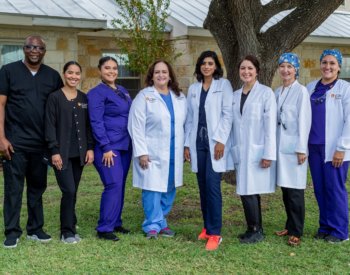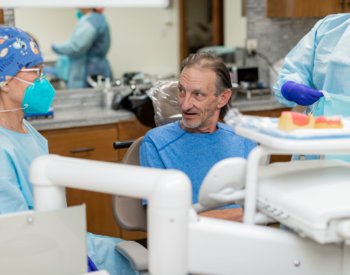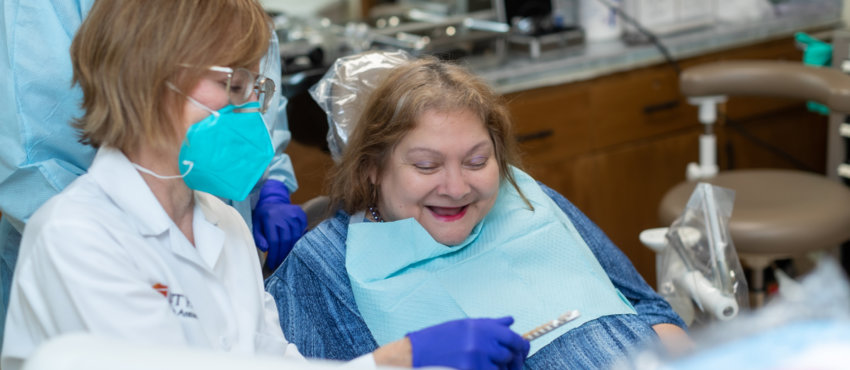Mary Vermersch had to have all her upper and lower teeth removed, and partial dentures haven’t worked well for her since.
She is among a slice of Texas nursing home residents unable to qualify for complete dentures under any governmental dental program, and private dental insurance either doesn’t cover it or is unaffordable.
Then she learned about a groundbreaking mobile dental service of The University of Texas Health Science Center at San Antonio, also known as UT Health San Antonio, developed just for nursing home residents.
“It’s my dream come true,” Vermersch said, her voice cracking as she examined samples for her new dentures. “I have no other way at all, and they say it costs a lot of money. It is a godsend for me.”
The initiative of the UT Health San Antonio School of Dentistry is called HOPE, which stands for Holistic Oral health Program for Elders. Dentists, hygienists and dental public health residents provide general dentistry services ranging from routine exams to extractions, fillings and dentures – bringing those services to the nursing homes, free of charge for those without coverage.
It is funded by the Centers for Medicare and Medicaid Services, part of the U.S. Department of Health and Human Services, and is being offered to nursing homes throughout San Antonio and the surrounding area, within 65 miles. Believed to be one of the first initiatives of its kind, it could be a model for others to follow.
“We saw a huge need for this service, as a large number of nursing home residents are unable to receive this care, with either no insurance or funds to pay for it,” said Suman N. Challa, BDS, MSPH, an associate dean of the UT Health San Antonio dental school who heads the initiative. “Our mission is to bring the highest quality of kind and compassionate oral health care to nursing home residents most in need.”
The current funding is good for three years. The mobile service has been operating for a few months, and already is serving more than 13 locations and nearly 500 patients.
At the RJ Meridian Care Center nursing home in San Antonio, resident and HOPE denture patient Alan Anderson is clear about what he thinks of the program.
“I haven’t had a smile in 30 years, and I’m really looking forward to having a great smile,” he said. “My daughter hasn’t seen me smile with teeth at all. She said I’m going to be the handsomest man she’s ever seen with teeth.”
Serving the vulnerable

“I’m so blessed to be part of this program,” said Josephine McCumber, RDH, MS, HOPE’s lead dental hygienist. “Just going out and seeing the smiles on the residents’ faces and being able to provide these services at no cost to the patient is amazing.”
McCumber with HOPE dental assistants Evelyn Trujillo and Anna Rodriguez aim to provide enthusiastic support and compassionate care to the nursing home residents.
“One of my favorite quotes, ‘Service is the rent we pay while on earth,’ exemplifies the mission of the HOPE program and dental public health,” said Magda A. de la Torre, RDH, MPH, clinical assistant professor of comprehensive dentistry at UT Health San Antonio, and adviser to the HOPE team. “The HOPE team serves a vulnerable community that may not otherwise receive the oral health care they need.”
Sarah Dirks, DDS, a fellow clinical assistant professor of comprehensive dentistry at the school, previously was on the dental school faculty before leaving to open her own practice to focus on geriatric dentistry. Earlier this year, she sold her practice after 15 years, and returned to the school to be dentist consultant for the HOPE program.
“Without this program, the social workers in charge of trying to find care were stuck,” she said. “What did they do if they had someone who didn’t qualify for dental services, and that person had a toothache? There was really no avenue. They were just ecstatic when we said this program was being developed.”
Dr. Dirks is performing many of the same services as before with her private practice – only now, she and the HOPE team travel to the patients. There are six sets of portable dental equipment, with each set staying at the nursing homes for several weeks before being transported to other sites.
“People ask me why I do what I do, and partly I think it’s because growing up with a sister with Down syndrome, it made me very conscious of the vulnerable,” she said. “The most profound experiences you can have in life are usually when you’re interacting with the vulnerable. So, I consider it an honor and a humbling thing to be able to do.”
She hopes to inspire dental public health residents and the next generation of dentists to consider geriatrics as a viable avenue to see patients.
“This has been a really satisfying experience, because I see the good that comes from it, hearing the stories from a lot of these people, and how they have been impacted,” said Rochisha Singh Marwaha, BDS, MPH, also a clinical assistant professor of comprehensive dentistry at the school, and an experienced dental public health professional who advises the HOPE team on clinical operations.
“They can smile, they can eat good food, and they can be more social,” she said. “It’s not just about their physical health that’s being taken care of through this program, but also mentally and psychologically gives their self-esteem a boost.”
“What the HOPE team is doing for our nursing home residents is life-changing,” said Rosalie Aguilar, PhD, MS, coordinator for the HOPE program. “Already we’re seeing and hearing about the profound impact this program is having on so many patients’ lives and the community at large.”
Dr. Aguilar, along with academic programs coordinator Danette Besancon, works closely with the nursing home’s social worker and administrator to bring the HOPE program to the facility. She hopes the program will continue to grow and make oral health care available to more nursing home residents in need.
Something to smile about

At the RJ Meridian Care Center, resident Anderson said he doesn’t have dental insurance, and although he has Medicaid, it doesn’t cover dentures in Texas. Which makes him all the more grateful.
“This lady right here,” he said, turning to Dr. Dirks at chair-side, “she has done more, giving me partial plates and whole plates … I’ve never seen anyone do the things she does. And it doesn’t hurt. If it weren’t for her, I wouldn’t have teeth at all. I’m just going to smile all the time.”
Vermersch, another of Dr. Dirks’ new-denture patients at the home, is especially motivated. “I have bad self-esteem,” she said. “I’m always looking down. They don’t see beautiful teeth.”
But that’s about to change. “I’m ready!” she exclaimed. “The Lord picked me. I’m just happy and looking forward.”
If you have a loved one at a long-term care facility or know of a nursing home that’s interested in participating in the HOPE initiative, please contact the program coordinator at (210) 450-6114, or aguilarr2@uthscsa.edu.


